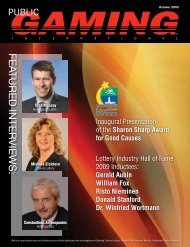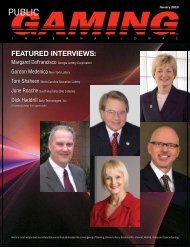The regular .pdf file can be viewed here. - Public Gaming Research ...
The regular .pdf file can be viewed here. - Public Gaming Research ...
The regular .pdf file can be viewed here. - Public Gaming Research ...
You also want an ePaper? Increase the reach of your titles
YUMPU automatically turns print PDFs into web optimized ePapers that Google loves.
<strong>Public</strong> <strong>Gaming</strong><br />
Mary Neubauer<br />
Vice President of External Relations, Iowa Lottery<br />
Social Media. What is it exactly, how does it work, who’s using it, and what does it<br />
mean to our business? Those are some of the questions that many of us are asking.<br />
Mary Neubauer and the Iowa Lottery have <strong>be</strong>en working on those questions<br />
for over two years now and have at least some of the answers. Ms. Neubauer<br />
explains how the project got started, w<strong>here</strong> the Lottery is at today, what’s hoped<br />
for in the future, and some of the key components to success in this space.<br />
(This interview is continued online. Please go to www.publicgaming.com to see this interview in its entirety.)<br />
<strong>Public</strong> <strong>Gaming</strong>: Let’s start by asking the<br />
most basic question. What exactly is “Social<br />
Media?” Most of us have a Facebook,<br />
MySpace or LinkedIn account and have seen<br />
videos of a relative’s wedding or friend’s funny<br />
episode posted on YouTu<strong>be</strong> and so have some<br />
idea of what this is about. Is t<strong>here</strong> a more precise<br />
definition for what is meant by “social<br />
media?”<br />
Mary Neubauer: That’s a good question<br />
<strong>be</strong>cause it really is so much more than a new<br />
set of tools that enhance communications. It<br />
is that, of course, but it is our thought that<br />
“social media” is already transforming the way<br />
people interact with each other, manage relationships<br />
and time, get and share information,<br />
and basically live their lives. To try to<br />
answer your question, I would say that “social<br />
media” involves the digital tools that people<br />
are using to magnify their circle of influence<br />
and relationships. It may have started on a social<br />
level, but those same tools <strong>can</strong> produce<br />
results on a business level as well. May<strong>be</strong> the<br />
<strong>be</strong>st way to look at it is to start on a personal<br />
level: Think about how you may have <strong>be</strong>en<br />
communicating over the past several years.<br />
It wasn’t too long ago that you might have<br />
interacted with some people just once a year,<br />
with a Christmas or holiday greeting telling<br />
relatives and friends what’s happened in your<br />
life over the past year. Or, you’d pick up the<br />
phone and call a friend or relative to catch<br />
up. That evolved into group e-mail lists in<br />
which you’d copy all your friends on a topic<br />
or a joke that you thought they’d enjoy. You<br />
may still <strong>be</strong> using all of those tools today, but<br />
you’ve also likely expanded the list of communications<br />
techniques in your arsenal. Now<br />
t<strong>here</strong>’s Facebook, w<strong>here</strong> in just a few minutes<br />
two or three times a week you <strong>can</strong> post pictures,<br />
talk about what you’re doing or recommend<br />
a good movie, book or restaurant. And<br />
all the friends you have on Facebook are able<br />
to see what you’ve shared and comment back.<br />
May<strong>be</strong> one or two of them have read the<br />
same book and have a comment about it and<br />
you start a conversation that, were it not for<br />
Facebook, likely wouldn’t have happened. Of<br />
course, at the same time, you are seeing the<br />
posts of those friends and quickly s<strong>can</strong>ning to<br />
see what they’re up to. You notice that one of<br />
them is in Paris and is asking for recommendations<br />
on restaurants t<strong>here</strong>. You’ve <strong>be</strong>en to<br />
Paris and remem<strong>be</strong>r the great meals you had<br />
in some of the off-the-<strong>be</strong>aten-path neighborhood<br />
bistros, so you give some suggestions. In<br />
just minutes you’re able to keep up with the<br />
activities of all your friends and relatives. It’s<br />
actually quite fun <strong>be</strong>cause it takes so little effort<br />
to see the interests and activities of all<br />
your friends and then pick and choose to interact<br />
on whatever level you want. Frankly, I<br />
don’t know how you would have the time to<br />
interact with so many people at once without<br />
a tool like Facebook.<br />
I’m sharing all of this background <strong>be</strong>cause<br />
the first step to understanding how to use social<br />
media to advance your business objectives is to<br />
understand how and why it’s changing the social<br />
habits of the people who are tuned into it.<br />
Back to your original question: As we’re<br />
talking, I pulled up the Wikipedia entry for<br />
“social media.” It descri<strong>be</strong>s social media as “the<br />
democratization of information, transforming<br />
people from content readers into publishers.”<br />
Wikipedia, of course, is the quintessential<br />
example of that: an encyclopedia created by<br />
everyone for everyone. It’s the ultimate collaborative<br />
enterprise that continually evolves<br />
with every new entry.<br />
If you approach it conceptually, social<br />
media isn’t just about a more efficient way<br />
to share information with friends. It’s about<br />
harnessing the energy, talents and knowledge<br />
of people everyw<strong>here</strong> in a way that’s not <strong>be</strong>en<br />
done <strong>be</strong>fore. <strong>The</strong> ability of social media to<br />
convert this untapped intelligence is boundless.<br />
What if we could snap our fingers and<br />
have a massive brain dump in which all of us<br />
who are thinking about a topic, like how to<br />
engage the millennial generation with lotteries<br />
for example, instantly had access to the<br />
brightest ideas of each of our colleagues? It’s<br />
this collaborative function of social media<br />
that is unleashing the power of people working<br />
and pulling together. Again quoting Wikipedia,<br />
social media is “a fusion of sociology and<br />
technology, transforming monologues (one to<br />
many) into dialogues (many to many), creating<br />
a shift in how people discover, read and<br />
share news, information and content.”<br />
I prefer to think of social media in that broad<br />
sense: It’s the digital means by which people<br />
come together to create a much <strong>be</strong>tter result<br />
than they could have achieved by themselves.<br />
As you <strong>can</strong> tell, what may have started as a<br />
marketing or advertising idea has blossomed<br />
into something much bigger than that.<br />
Let’s start with the build-up to the social<br />
…continued on page 28<br />
<strong>Public</strong> <strong>Gaming</strong> International • Septem<strong>be</strong>r 2009 18




